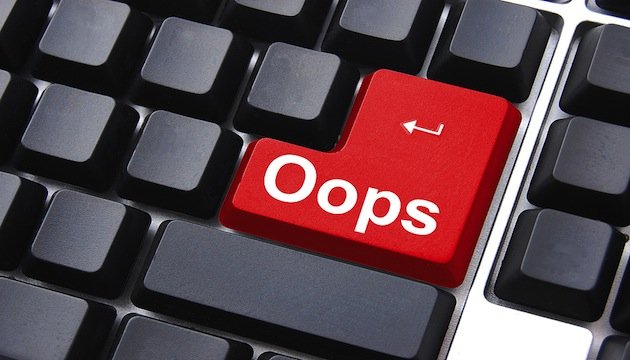
In the game of life it’s a good idea to have a few early losses,
which relieves you of the pressure of trying to maintain an undefeated season.
— Bill Vaughan
A Valuable, Albeit Painful, Lesson
When you are self-employed, when you run your own business, mistakes are inevitable. But learning from them is not. But that is where the nuggets are.
Several years ago, two partners and I planned a community event. Everyone told us it was a great idea. We got wonderful publicity from the local paper. Without much marketing on our part, lots of exhibitors bought space.
On the Friday evening that the event opened, television crews showed up. The exhibiters showed up. Almost nobody else came. We were in shock.
When I realized that we had a gigantic bomb on our hands, I went to the hotel room that served as our headquarters, curled up in a fetal position and cried for an hour. It felt like a public humiliation.
The next morning I returned with my game face on, but it was an excruciatingly painful day.
What Happened Next
Six months later, I was well on my way to creating the business of my dreams. I had gotten over the emotional distress of that failure and was finally ready to take a good look at where we went wrong. I learned valuable lessons from the experience and have never repeated the worst of those mistakes.
As grateful as I am for that, there was an even greater gift that came from that horrible flop. As I was reinventing my business, I found that little detours and disappointments rolled right off of me.
When things didn’t work out as I had planned, I found that disappointment was temporary and I rallied quickly. Nothing was ever as horrible as that humiliating time so by comparison, any failure seemed mild and manageable.
Surviving disaster can make us stronger, but it doesn’t have to make us heartless. If anything, I had more empathy for struggles—my own and others.
While I realize that this failure speeded up my moving in a better direction, I suspect that there were other blessings I still don’t recognize. As Thomas Edison—who amassed thousands of failures—said, “Failures, so called, are but finger posts pointing out the right direction to those who are willing to learn.”
But Here’s the Rub
We’ve all known people who go through a series of bad personal relationships and never realize that they’re continuing to attract the same personality in a different body. That’s also true in business where the same problems keep recurring time and again.
The only way to change these miserable situations is by taking a long hard look and choosing to replace it with something more satisfying.
When we refuse to learn the lessons, the lessons keep showing up. Sadly, if we fail to learn, we are forced to learn to live with failure.
One Mistake We Can Avoid
While some mistakes are necessary parts of our curriculum, there’s a common error that we can avoid. It’s a lesson I learned long ago—and was reminded of again when I had a seminar that didn’t go well.
Now, of course, I want every single seminar to be as good as I can make it, but sometimes I fail to get the cooperation of the students. Feeling quite drained by the unpleasant experience, I gave myself permission to fret and fuss for a bit. “It’s just one seminar,” I pointed out to myself. “It’s not your dream.”
When you’re feeling discouraged or think you have failed beyond recovery, remember this: do not confuse a project with a dream. One failed project does not make for a failed dream.
It’s essential that we understand the difference and don’t make the biggest mistake of all by abandoning our heartfelt dreams.
Or just memorize these words from George Bernard Shaw: “A life spent in making mistakes is not only more honorable, but more useful, than a life spent in doing nothing.”








